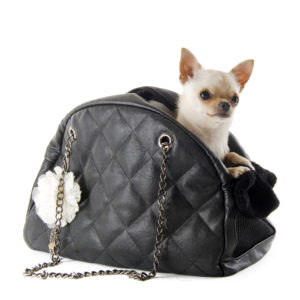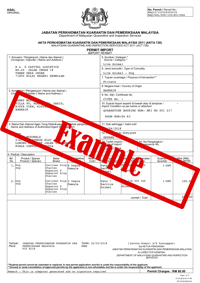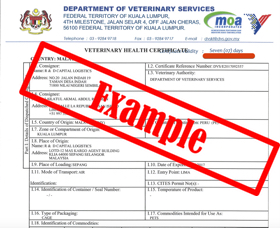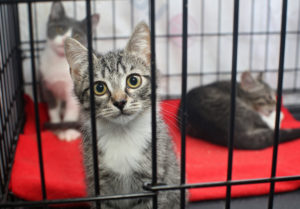Malaysia Pet Travel & Import Regulations

Moving to or from Malaysia with your pet can be quite tedious at the best of times, especially with the paperwork, permits clearance, vaccinations, quarantine process and more. However, these requirements can be arranged in a better way by planning ahead. To help you get started, we have created a pet relocation list, that highlights the common things that must be sorted out before you can safely relocate your pet to your destination.
*Rev 1.2 (updated on 28/04/2018)

Pet Microchip
Your pet must be microchipped with an ISO 11784 pet microchip, which carries a 15 digit non-encrypted code in it. If your pet’s microchip is not ISO 11784 compliant, you will need to arrange your own microchip scanner.

Import Permit
Your pet must be accompanied with an Import permit issued by the Department of Malaysian Quarantine and Inspection Services (MAQIS) and also verified by Department of Veterinary Services Malaysia (DVS). The import permit can be applied for through an appointed licensed agent. The permit document is valid for 30 days from issuance.

Vaccinations
Your pet must be vaccinated against rabies between 30 days and 12 months prior to import into Malaysia. The vaccination document / pet passport that reflects all routine vaccinations by certified veterinarian must be presented to airport customs (MAQIS).

Rabies Titer test (RNATT)
Pets entering Malaysia would not require a rabies titer test (RNATT).

Veterinary Health Certificate (Government Vet HC)
An USDA accredited veterinarian must complete the veterinary health certificate 7 days prior to relocating your pet to Malaysia. If your pet is traveling from the United States or Canada, the certificate must be endorsed by the USDA or CFIA. If you are relocating your pet outside other countries, the governing authority of your country is responsible for endorsing the health certificate.

Quarantine (KLIA Animal Quarantine Station)
If your pet is entering Malaysia from rabies free countries (United Kingdom, Northern Ireland, Sweden, New Zealand, Japan, Brunei or Singapore), your pet will not be required to be quarantined by the Malaysian customs control, if all requirements are met. However, if your pet is traveling from countries that are not on the rabies free list, your pet will be detained in quarantine for a compulsory period of no less than seven (7) days (10 days for dogs and cats entering from Australia). If your pet is free of any evidence of infection, it will be released after the 7 day quarantine period. However, if deemed necessary, your pet’s quarantine period can be extended up to six (6) months based on a risk assessment on a case by case basis. Quarantine facilities in Malaysia are available at Kuala Lumpur International Airport (KLIA) at Sepang and Penang International Airport at Penang Island for cats and dogs. Cats and dogs that require quarantine must enter through one of these two airports. Advance quarantine space booking must be made a minimum of 14 days prior to arrival.

Banned Breeds
If your pet dog is one of the following breeds it will not be allowed to be relocated into Malaysia: American Pit Bull, Pit Bull Terrier, Pit Bull, American Staffordshire Terrier, Staffordshire Bull Terrier, American Bulldog, Neapolitan Mastiff, Japanese Tosa, Akita, Dogo Argentino and Fila Braziliero. However, if your pet dog is a Rottweiler, Doberman Pinscher, German Shepherd, Belgian Shepherd, East European Shepherd, Bull Mastiff or Bull Terrier, you will need to write-in an application letter to the Director of State Veterinary Services (State DVS) in Malaysia, to approve your pet’s relocation.

Other Live Animals or Reptiles
Birds of any kind are not allowed to be relocated into Malaysia. Pets such as invertebrates, tropical fish, reptiles, amphibia and mammals (rodents or rabbits) are not subject to the requirements of rabies vaccination. However, they may have to meet other veterinary requirements and should also have a government veterinary health certificate to enter Malaysia.

CITES-listed Species
If you have a pet turtle or parrot that you would like to relocate to Malaysia, you must apply for the Convention on International Trade in Endangered Species of Wild Fauna and Flora (CITES) permit, which will determine if your pet is from an endangered species.

Need Professional Advice?
Would you like to know more about the processes listed above? Or would you like us to assist you with relocating your pets to Malaysia or from Malaysia to another country? Feel free to contact us at:
Call / Text / Whatsapp – +6014-644 3434
Email – inquries@rndcapitallogistics.
Facebook Messenger: R&D Capital Logistics
* To the best of our ability, we ensure that recommendations given on our blog reflect the current pet relocation regulations. We cannot predict how a given country may enforce these regulations. Non-compliance may result in the need to make arrangements to: board your pet in a quarantine center at your own expense, return your pet to the country of origin, or euthanize your pet. We recommend that you minimize the disruptions that may occur during the pet relocation process, by following the rules of the country you are visiting.

